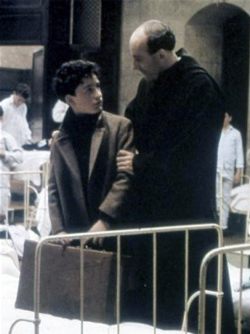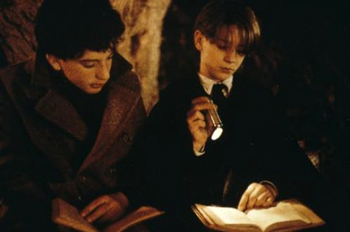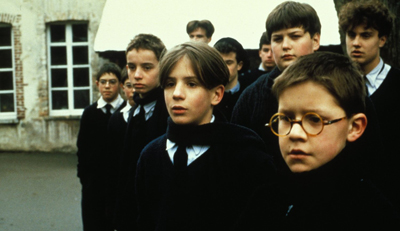
 |
|
|
|
One of the best films ever about the German occupation of France, Au revoir les enfants puts the Holocaust on a personal basis, as experienced by young boys in a posh Catholic boarding school. As opposed to films that attempt to show the scope and breadth of the crimes of the Nazi occupation, this quiet 1987 picture focuses on a "small" incident that took place in 1944. The director Louis Malle was present when the Gestapo entered his private Catholic school and seized three pupils and the school principal, a priest. Malle considered the event to be his personal transition into adulthood, the moment when he realized that the world is not a storybook where goodness is rewarded and badness punished. Made after spending almost ten years in America making increasingly less satisfactory commercial films, Au revoir les enfants was a triumph for director Malle. It was a personal project he had wanted to make for decades. The film relates more closely to two Malle successes of the early 1970s. His Lacombe, Lucien was an unblinking portrait of a young collaborator during the occupation. The partly autobiographical Murmur of the Heart (Le souffle au coeur) is a tale of a young troublemaker growing up in a well-to-do Parisian family. In 2006 Criterion released all three in a DVD set called 3 Films by Louis Malle. 
As in Murmur of the Heart, the young hero of Au revoir les enfants is a young boy with a strong emotional attachment to a beautiful mother. Julian Quentin (Gaspard Manesse) takes the train to school with his older brother François (Stanislaus Carré de Malberg). Due to wartime restrictions the school has almost no heat and the little food available is strictly rationed. A boy faints in chapel and the kindly principal Père Jean (Philippe Morier-Genoud) asks that boys share the food they receive from home. Like some of his friends, Julian trades his mother's jam with the crippled kitchen handyman Joseph (François Négret). Joseph uses the proceeds to fund his love life in town. It appears that both Joseph and the cook are selling some of the school's food supplies on the black market. Julian befriends a new student named Jean Bonnet (Raphael Fejtö), a quiet fellow who excels in math. At first unimpressed, Julian discovers that Jean shares a fondness for books. School business goes on as he students put up with blackouts and air raids and the everpresent cold. The boys are charmed by the new piano teacher Mlle Davenne (Irène Jacob of The Double Life of Veronique). Julian slowly puts together the truth when his friend Jean balks at answering personal questions, avoids certain meats and prays by himself at night. Julian also sees the school staff hide Jean when the collaborationist militia comes to call. When Julian asks what Jews are, exactly, his brother tells him, "They're smarter than us." Au revoir les enfants approaches its historical and cultural issues through the eyes of a child, which is a particularly effective way to reach millions of people unfamiliar with the everyday horror of the Holocaust. Julian Quentin is a normal kid with mother issues. He likes to read the hot passages from Arabian Nights but occasionally wets his bed. A movie that could easily become a sentimental mess is kept on task by Louis Malle's refusal to make his schoolboys into little heroes of the resistance. With plenty of evidence of malice all around him, Julian goes around saying appropriately egocentric, clueless things like, "I'm the only one around here who thinks about death!" Julian isn't alone, as everyone we see is coping with hardship by attending to their self-interest. The pitiful Joseph feels that his maltreatment by the students justifies his thefts of the school's food. Besides, women will only sleep with him if he brings food. We see German soldiers asking for confession and trying to be friendly ("We're Catholics too."). We also see the bullying militia in action. One of the nuns in the school infirmary is a malicious anti-Semite. The boys, of course, recite their parents' values without really understanding what they're saying. Julian's mother is of little help in this. A beauty that still turns heads, she doesn't mind encouraging compliments from some German soldiers at the next table. Only the priests have fully measured the horror of the situation, and weighed it against their responsibility as humanists. Père Jean tries to lecture the boys: "Make good use of your freedom." 
An almost perfectly directed movie, Au revoir les enfants presents remarkable performances by its young cast. When the young thinker Julian is confused, he stands with an open-mouthed blank face, like a boy of five. He and Jean share several formative adventures -- getting lost in the woods and seeing a black boar; playing boogie-woogie piano together -- until Julian has become a willing keeper of secrets. Jean is hiding a different surname. He hasn't seen his parents in two years and something inside him has already realized that he'll be found out. Malle's brilliant casting sense brings together a group of kids that look like they're from "good" families. They must wear shorts and socks in the freezing cold, making the show's action seem all the more authentic: production stills show Malle bundled up like a mummy. Young Gaspard Manesse and Raphael Fejtö give such natural performances that we forget entirely that they are actors playing roles. Louis Malle introduces many of the moral questions of the occupation without offering specific judgments. Joseph's heinous actions cannot be forgiven but they are understandable considering his ostracization and the unequal punishment he suffers. An elderly Jewish man caught eating in a restricted restaurant is not a humble stereotype but a Frenchman equally as proud and stubborn as his Christian neighbors. The priests manage as best they can, surely realizing that their efforts have little chance of succeeding. Père Jean is locked into his belief system as well -- when Jean Bonnet lines up to receive communion, he skips him. Had the wrong person noticed, the game would have been finished right then and there. Malle gives the "older brother" character a position of honor -- only François speaks out against the militia, and he tells his mother that he wants to join the resistance. But for the meantime, he'll continue to steal kisses from the sexy piano teacher. Au revoir les enfants has one of those endings viewers are likely not to forget. It doesn't go for trauma or sensationalism but instead has the sickly believability of "everyday" moral outrages, the kind we feel responsible for even if we are not personally involved. Unlike Holocaust movies with perverse attractions -- organized brutality is undeniably fascinating -- Louis Malle's movie makes us reconsider our own relationship to injustices around us. We share Louis Malle's discovery of an event witnessed in childhood that became of primary importance to the way he saw the world. 
Criterion's Blu-ray of Au revoir les enfants is a flawless encoding of a film replete with dark and evocative images. The school looks cold, and the schoolboys' red noses and knees show the low temperatures, especially in the final chilling scenes outside the classrooms. The soundtrack uses a few classical cues, avoiding the typical radio sourced audio that makes it seem that every Frenchman was a resistance patriot listening 'round the clock to Radio London. Jean Bonnet is convincing playing Schubert for the new piano teacher. Criterion's extras are repeated from the earlier DVD release. Biographer Pierre Billard contributes a long analysis of the movie and his personal friend Malle, while Candice Bergen talks about her husband's return to France and this late-career success. Guy Magen's study of the Joseph character, made for the earlier release, is also present. Director Malle is heard in audio excerpts from a 1988 AFI interview. In one scene reminiscent of Sullivan's Travels the boys watch a film of Charlie Chaplin's comedy The Immigrant. Criterion includes David Shepard's restoration of The Immigrant as another extra. The insert booklet contains an informed essay on the film by Philip Kemp and a piece by Francis J. Murphy on Père Jacques, the faithful priest behind the real-life incident on which Au revoir les enfants is based.
On a scale of Excellent, Good, Fair, and Poor,
Au revoir les enfants Blu-ray rates:
Reviews on the Savant main site have additional credits information and are often updated and annotated with reader input and graphics. Also, don't forget the 2010 Savant Wish List. T'was Ever Thus.
Review Staff | About DVD Talk | Newsletter Subscribe | Join DVD Talk Forum |
| ||||||||||||||||||